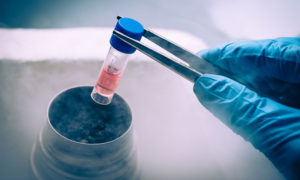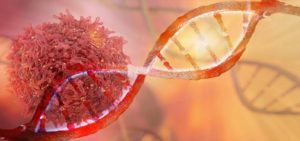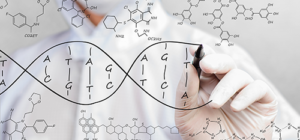Epithelioid Sarcoma Specimens
Bay Biosciences provides high quality, clinical grade bio-samples, cryogenically preserved tumor tissue samples, sera (serum), plasma and peripheral blood mononuclear cells (PBMC) biofluid specimens from patients diagnosed with Epithelioid Sarcoma.
The sera (serum), plasma and PBMC biofluid samples are processed from patient’s peripheral whole-blood using customized collection and processing protocols. The Epithelioid Sarcoma bio-specimens are collected from unique patients diagnosed with Epithelioid Sarcoma and are provided to a valued pharmaceutical customer for research, diagnostics, development and drug discovery.

Epithelioid Sarcoma Overview
Epithelioid sarcoma is a rare, slow-growing type of soft tissue cancer. Most cases begin in the soft tissue under the skin of a finger, hand, forearm, lower leg or foot, though it can start in other areas of the body. Epithelioid sarcoma most commonly strikes young adults, yet no age group is immune. The disease has a tendency to develop local recurrences and metastasis thereafter to regional lymph nodes, lung, bone, brain, and other locations, including the scalp. Almost 50 percent of epithelioid sarcomas will eventually metastasize distantly, most often to lymph nodes and the lungs, but also to skin and soft-tissue sites. In some rare cases Epithelioid sarcoma have been reported in the pelvis, vulva, penis, and spine. Unlike most other sarcomas, epithelioid sarcoma has a tendency for lymph node metastasis. In a long term study, almost half of the patients with epithelioid sarcoma developed metastatic disease, with the lung, lymph nodes and scalp being the most common sites.
Typically, epithelioid sarcoma starts as a small firm growth or lump that’s painless. because of the tendency toward non-painful “benign nature” indolent growth, epithelioid sarcoma (ES) may be present for months to years before the patient seeks medical attention. It usually starts out as a single growth, but multiple growths may occur by the time a person seeks medical help. Sometimes this type of sarcoma appears as ulcers that don’t heal, looking like open wounds over the growths. The classic form (distal-type) of epithelioid sarcoma mainly occurs in teenagers and young adults. A rarer form, called large-cell (proximal-type) epithelioid sarcoma, tends to be more aggressive and mainly affects adults.
Epithelioid sarcoma is a slow growing tumor with a high rate of recurrence and and can spread (metastasize) to other areas of the body. Slow growth of the tumor, paucity of symptoms, benign appearance in early stage imaging studies, and indistinctive pathologic findings in some cases makes the diagnosis of epithelioid sarcoma challenging. The rarity of the disease also makes performing large controlled clinical trials to evaluate different treatment options almost impossible.
Epithelioid sarcoma has a high rate of relapse after initial treatment and tends to recur locally, at or near the original tumor site. Epithelioid sarcoma also demonstrates lymphatic spread and metastasis in many cases. These events, as well as advanced stage (progression) and grade (aggressiveness), are predictive of an overall worse outcome. The overall five-year survival rate for epithelioid sarcoma is anywhere from 25 to 78%. Importantly, the long term survival rate 10-year and 15-year survival rate drops off significantly. Associated with a more positive outcome are younger age, female vs. male sex, distal vs. proximal location, smaller tumor size, and negative margins upon tumor resection.
Epithelioid Sarcoma Signs and Symptoms
Epithelioid sarcoma is a slow-growing and relatively painless tumor, often resulting in a lengthy period of time between presentation and diagnosis. These tumors can be difficult to diagnose because they may be mistaken for many other types of growths. Due to its ambiguity, it is often misdiagnosed, mistaken as a persistent wart or cyst. It most commonly presents itself in the distal limbs (fingers, hands, forearms, or feet) as a small, soft mass or a series of bumps. It is most often described as a firm to hard palpable mass, either in the deep soft tissue or in the dermis. Often, ulcerate causing which is mistakenly diagnosed as a poorly healing traumatic wound or wart. Some of the patients will present with multifocal tumor, while some patients will present with metastatic disease.
A Epithelioid sarcoma may not cause any signs and symptoms in its early stages. As the tumor grows, it may cause:
- A noticeable lump or swelling
- Pain if a tumor presses on nerves or muscles
- A lump that is increasing in size or becomes painful
- A lump of any size that’s located deep within a muscle
- Recurrence of a lump that’s been removed
Epithelioid Sarcoma Genetic Mutations
The most common genetic mutation found in majority of the epithelioid sarcoma patients is the inactivation of the SMARCB1 gene or the loss of INI-1 function, which is thought to be a major contributor to disease progression. The SMARCB1 gene also termed as BAF47, INI1, or hSNF5 is located on chromosome 22q11.2 and codes for a member of the SW1/SNF chromatin remodeling complex. Loss of SMARCB1 function is the most common genetic mutation observed in epithelioid sarcoma, and this dysfunction is likely a major driver of disease progression. SMARCB1 is a core protein subunit of the 15 subunit SWI/SNF (or BAF) complex involved in regulating the nucleosome architecture of our genome and has been shown to be a potent tumor suppressor gene, that means its primary role is to control cell division and to even halt division under appropriate circumstances (i.e. signals to over-replicate). As this tumor suppressor is commonly inactivated in epithelioid sarcoma, cell division can fail to appropriately halt, resulting in unregulated cellular growth and the formation of cancer tumors. Several research teams are currently developing techniques to reverse this loss of genetic function characteristic of epithelioid sarcoma.

Detailed clinical data, MRI, PET scans, tumor tissue biopsy, Immunohistochemistry staining of INI1, elevated biomarker levels, genetic and metabolic information, histopathological findings, annotations associated with epithelioid sarcoma patient’s specimens is provided to a valued customer for research, development and drug discovery. The Epithelioid Sarcoma samples sera (serum), plasma and peripheral blood mononuclear cells (PBMC) biofluid samples are processed from patients peripheral whole-blood using customized collection and processing protocols provided by the researcher.
Bay Biosciences is a global leader in providing researchers with high quality, clinical grade, fully characterized human tissue samples, bio-specimens and human bio-fluid collections from cancer (tumor) tissue, cancer sera (serum), cancer plasma, cancer PBMC and human tissue samples from most other therapeutic areas and diseases.
Bay Biosciences maintains and manages it’s own bio-repository, human tissue bank (biobank) consisting of thousands of diseased samples (specimens) and from normal healthy donors available in all formats and types. Our biobank procures and stores fully consented, deidentified and institutional review boards (IRB) approved human tissue samples and matched controls.
All our human human tissue collections, human specimens and human bio-fluids are provided with detailed samples associated patient’s clinical data. This critical patient’s clinical data includes information relating to their past and current disease, treatment history, lifestyle choices, biomarkers and genetic information. Patient’s data is extremely valuable for researchers and is used to help identify new effective treatments (drug discovery & development) in oncology, other therapeutic areas and diseases. This clinical information is critical to demonstrate their impact, monitor the safety of medicines, testing & diagnostics, and generate new knowledge about the causes of disease and illness.
Bay Biosciences banks wide variety of human tissue samples and biological samples including cryogenically preserved -80°C, fresh, fresh frozen tissue samples, tumor tissue samples, FFPE’s, tissue slides, with matching human bio-fluids, whole blood and blood derived products such as serum, plasma and PBMC’s.
Bay Biosciences is a global leader in collecting and providing human tissue samples according to the researchers specified requirements and customized, tailor made collection protocols. Please contact us anytime to discuss your special research projects and customized human tissue sample requirements.
Bay Biosciences provides human tissue samples (human specimens) from diseased and normal healthy donors; including peripheral whole-blood, amniotic fluid, bronchoalveolar lavage fluid (BAL), sputum, pleural effusion, cerebrospinal fluid (CSF), serum (sera), plasma, peripheral blood mononuclear cells (PBMC’s), saliva, Buffy coat, urine, stool samples, aqueous humor, vitreous humor, kidney stones, renal calculi, nephrolithiasis, urolithiasis and other bodily fluids from most diseases including cancer. We can also procure most human bio-specimens and can do special collections and requests of human samples that are difficult to find. All our human tissue samples are procured through IRB approved clinical protocols and procedures.
In addition to the standard processing protocols Bay Biosciences can also provide human plasma, serum, PBMC bio-fluid samples using custom processing protocols, you can buy donor specific sample collections in higher volumes and specified sample aliquoting from us.
Bay Biosciences also provides human samples from normal healthy donors, volunteers, for controls and clinical research, contact us Now.
日本のお客様は、ベイバイオサイエンスジャパンBay Biosciences Japan またはhttp://baybiosciences-jp.com/contact/までご連絡ください。



